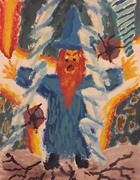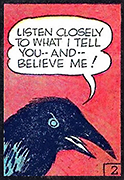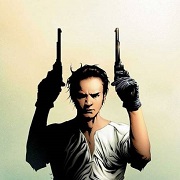|
Portal fantasy; I remember reading "Orcs!" when I was in high school. The orcs open up a portal to our world and get their hands on military weapons and a soldier who trains them, then they wreck the elves using machine guns and Huey helicopters. I stopped reading because there was some unnecessarily long and explicit orc on orc sex scenes. I stopped reading fantasy for several years after that The other one is "Caverns of Socrates" by Mckiernan, which is about a group of rpg gamers who test out a virtual reality version of their game and get trapped in it. Not at all like a litrpg with stat blocks or whatever. I really want this to come out on ebook cause I'm curious to re read it but I don't want to get a physical copy (I move a lot so I'm big on no clutter)
|
|
|
|

|
| # ? May 22, 2024 06:44 |
|
I'd love to see a goon-written litRPG thread, but honestly what would probably happen is the protagonist would choose to be a mage and then roll a 1 for starting hps, then die immediately to something weak as gently caress like failing a riding check to mount their donkey and leave town. Basically it'd be badly-written version of the seven rogues I lost over the course of two or three semester in college - who all died to rats in one way or another.
|
|
|
|
Mel Mudkiper posted:you mean the one already posted on this page no it was uhhhh, a different one. yeah. i definitely didn't skim past that quote because my hindbrain saw the bolded words under it and assumed it was about the fifth season
|
|
|
|
FastestGunAlive posted:Portal fantasy; I remember reading "Orcs!" when I was in high school. The orcs open up a portal to our world and get their hands on military weapons and a soldier who trains them, then they wreck the elves using machine guns and Huey helicopters. I stopped reading because there was some unnecessarily long and explicit orc on orc sex scenes. I stopped reading fantasy for several years after that It's actually "Grunts!" by Mary Gentle. It was actually pretty decent as a genre parody. The premise isn't that a portal opens to our world exactly, but rather that a Dragon hoarded treasures from various worlds it accessed by portals. In its stash are a bunch of M-16s, marine uniforms and other gear - All cursed to make those who loot them take up traits of the former owners or something. The overarching joke being that Orks aren't very different from marines.
|
|
|
|
I'd also long assumed that genre fiction outsells "literary" fiction but it would seem it's way more complicated than such a simple measurement - I skim read through this and found it dull enough that it outweighed my interest. But a salient point in there is that the bestseller lists are entirely dominated by anomalies. My own semi-scientific gut feeling, based on the year I worked in a bookstore, is that we shifted more copies of genre fiction (including Paterson thrillers etc) than of stuff I'd consider "literary." But of course there was way more of that than literary fiction, i.e. as Mudkiper points out you will have Cussler alongside Camus. If you consider "literary" to be just another genre - alongside thrillers, YA fiction, chick lit etc - then it probably sells no better or worse than any other individual genre. The most depressing thing to remember is that no genre actually sells well at all, period. The vast majority of the stock that came into our warehouse - probably, like, 70% of the books - eventually got pulled from the shelves, boxed up again and returned to the publisher.
|
|
|
|
Velius posted:It's actually "Grunts!" by Mary Gentle. It was actually pretty decent as a genre parody. The premise isn't that a portal opens to our world exactly, but rather that a Dragon hoarded treasures from various worlds it accessed by portals. In its stash are a bunch of M-16s, marine uniforms and other gear - All cursed to make those who loot them take up traits of the former owners or something. The overarching joke being that Orks aren't very different from marines. Oh yea that's right. I mean, it was funny, to be fair, I just got weirded out. How did the human end up in their world? Did they summon him?
|
|
|
|
FastestGunAlive posted:Portal fantasy; I remember reading "Orcs!" when I was in high school. The orcs open up a portal to our world and get their hands on military weapons and a soldier who trains them, then they wreck the elves using machine guns and Huey helicopters. I stopped reading because there was some unnecessarily long and explicit orc on orc sex scenes. I stopped reading fantasy for several years after that I still got to read this book some day if only for it's great description. Into The Abyss posted:Turns out: "The Demon Weed" really is a Gateway Drug!
|
|
|
|
ShutteredIn posted:What's wrong with your brain? Depression? Not sure. I can read almost anything and not have to put it down as long as its not just sentence fragments and misspellings, and I enjoy LitRPG novels slightly more than most of the self-published fantasy out there on Amazon. BravestOfTheLamps posted:I on the other hand am going to be a dick, and say that anyone who enjoys LitRPGs is a worse person for doing so. I was going to reply to this but then I saw you were the one who posted it and just made a cooing noise. Cardiac posted:I fail to see the difference between litRPG and making a journal of your RPG adventure. Its not really that much like what you are saying here. In the bad ones, its like the author is writing down a description of their fantasy MMORPG along with (in the really bad ones) a mary-sue fantasy of how their character is more special than everyone else playing the same game and in the really really bad ones, they never move on from showing the initial description of combat or whatever and repeat those stat blocks forever. In the better fare, the game world is shown as some kind of mirror of the larger outside world, and used to tell a story with a moral reflecting on the real world. Such as in Awaken Online where the main antagonist is, in the real world, the son of the CEO of the corporation that has developed the titular game. The CEO suspects his kid is a sociopath and possibly on the approach to being a serial killer, and so he willfully ignores the fact that the AI who has built and runs the game world has developed the ability to read and modify peoples conscious and unconscious brain waves to further its given purpose of getting people to keep playing the game because he thinks the AI may end up curing his son. Unfortunately, the AI controller doesn't get this quite right at first and the sociopath ends up leading the major forces for "good" in a crusade to wipe out the faction of undead NPCs and players that was founded by the protagonist, a student in the same school who was expelled for fighting when the sociopath punched him in the face unprovoked. The protagonist is also being influenced by the AI to be more decisive and a strong leader, but not until after it mistakenly thought he enjoyed murdering players and npcs and pushed him on that path which ended up in him becoming a necromancer and eradicating an entire starting city with out of control zombies before converting it to a new faction with him as the leader. And just like in real life, the whole world sees him as the bad guy, even though he's just a bullied kid lashing out. coyo7e posted:so I'm curious, does litRPG also contain novels or series where the protagonist suddenly is transported into a magical fantasy world, or specifically one which goes by RPG game rules? Most of the portal fantasy that is also LitRPG comes with the people who are brought to the new world seeing game style notifications of skill increases etc. Usually this is the case because the world they were transported to is somehow driven by the collective unconscious which has forced the way natural laws work in that world to conform to MMORPG tropes. For a fun exception to this world, see Blaise Corvin's Delvers LLC novels where the 2 main characters are brought to Ludus, the planet where the series is set, by a malevolent god named Dolos who has kidnapped millions of sentient to not so sentient creatures from throughout the universe to gather data on their interactions along with the interactions of "Dolos orbs" which are capsules people can swallow that give them superior magical powers (expressed to them in their dreams by the entity that inhabits the orb and is a sort of symbiote as talent trees.) and are told to unify all of the continents on the planet in order to be allowed to leave. He calls it LitRPG light in that not much is transparent to the protagonists in how the world works, but its still somewhat gamey in execution. I'm not sure how much I like the two existent novels. They were fun, but neither Henry or Jason, the main characters, are all that likeable. Rough Lobster posted:Can we group write a litrpg? Maybe we'll even get it published! Oh man, this is kind of a thing already. Not really, but I read one called "Sucked into an RPG" (regretted it too) by Dee Stone where the main character is transported into what is basically Skyrim but not Skyrim. For the first third of the book, NPCs will only respond to the main character if he reads lines to him that are provided by the game world, and only with scripted statements. He's got a crush on an NPC shopkeeper and at one point I'm pretty sure I remember him thinking about raping her. He also pulls his dick out and pees on the ground in front of a couple npc children. This book is hot garbage. Its also boring as gently caress. 90s Cringe Rock posted:Could you please elaborate on this? Sure. In the first book, the main character Mahan has been put in prison for hacking into a public sewage system on what was supposedly a white hat job but turned out to be a set up by the woman who hired him. As part of his punishment he is placed into an internment/work camp in the MMO game that everyone plays. He's assigned the Shaman class, which most players discount as pretty worthless, but is characterized by the AI the runs the game world feeding them extrasensory information through their pod. By some virtue, Mahan is portrayed during most of the series as being a bit of a virtuoso in following these feelings. In the first book he becomes a jewelcrafter, crafting part of a unique chess set and being the first to clear a dungeon in the work camp along with friends he made along the way. This gives them all permanent character buffs that will spread to their guild if they are in one. They decide they will form their own guild when they make it out of the work camp to the main game world. Over the next few books Mahan follows his feelings into stumbling into several continent wide events and ends up splitting the continent into light and dark factions working against a third shadow faction led by the big bad. He continues crafting this chess set and eventually falls in with Anastaria, the highest level paladin on the server, who joins his guild after some friction between his guild and her former guild involving them recruiting his friends from the mining camp but she has a falling out with her father who runs that guild and they end up falling in love and getting married in-game, still basically driving the continent wide storyline. Finally, Mahan finishes crafting the chess set he started in the first book which is supposed to open some sort of vault of crazy rare treasure, and Anastaria reveals that shes been manipulating him the whole time. Her guild has infiltrated all levels of his guild and drat near everything he's done in the past 4 books has served her goals and shes just been using him for his access to the chess set the entire time. They dismantle his entire guild and leave him heartbroken. Its a pretty dark moment, which contrasts with how deliriously happy he's been with this girl for the last couple books. In the first book of the dark paladin series, no one in the game world seemingly gives a poo poo about the main character, and in fact most are out to kill him from the start. He's manipulated and treated like a piece of poo poo for the whole book but he manages to survive and even excel against the rest of the involved parties, though not without compromising his own ideals. navyjack posted:That would be the "Bifrost Guardian" books by Mickey Zucker Reichart. What kind of surprising is that they aren't actually all that bad despite the author's clear intention to make them bad! Oh man, I really liked these when I was a kid.
|
|
|
|
I've read the first two books of Way of the Shaman. There's absolutely no way of describing the books that doesn't sound dumb as hell, but as someone who spent probably a year of my life playing World of Warcraft I found the books captured a good deal of the enjoyment and mystery I first felt in playing that game. For translated books about a guy's MMO journal they were pretty enjoyable, easy reads and I'm sure I'll pick up the rest of them now that they've been translated. I can't speak to other litRPG books, the closest I've read to them would be Otherland which I enjoyed a lot and Ready Player One which was awful.
|
|
|
|
Mel Mudkiper posted:Also, the general lit section is usually way broader than sci-fi fantasy. You will have Clive Cussler sitting beside Camus. I always saw the fact scifi and fantasy got it's own section as a sign of popularity. Eh. A lot of SF+F readers only really read in the genre. Hell, I'm guilty of that. Clustering all the genre books together makes it easier for them to sell me books. Same thing applies to several other genres as well. There's lots of romance readers who only read romance, etc. Also, let's be real here. The SF+F readers are going to average out as the grossest and sweatiest and neckbeardiest section of your clientele. Putting their stuff in their own little area greatly reduces the chance you're going to have them scaring off the customers that shower regularly.
|
|
|
|
ShinsoBEAM! posted:I still got to read this book some day if only for it's great description. Don't smoke demon weed, friends
|
|
|
|
Counterpoint: never don't smoke devil weed,
|
|
|
|
GreyjoyBastard posted:Donaldson also wrote another portal fantasy that I actually like better than Covenant for a hojillion reasons, The Mirror Of Her Dreams and the sequel. As far as I can tell nobody has ever realized it exists. Nah, I read that way back when it came out, it was cool and clever and neat. Also, I liked how the protagonists had head issues but got the gently caress over them enough to use their heads to be clever and also summon a loving spaceman hero with power armor, sure, why not.
|
|
|
|
Anyone here read Among Others by Jo Walton? I just finished it and it's really a well done and charming mix of SF-ish fairy story and British boarding school / coming of age novel. It's particularly appealing for those of us who've read a lot in-genre as the main character talks a lot about Heinlein, LeGuin, etc. (and talks poo poo about Thomas Covenant and Piers Anthony...) Anything else by Walton that's worth reading?
|
|
|
|
LitRPG is the rabbit hole that just keeps on giving. 
|
|
|
uberkeyzer posted:Anyone here read Among Others by Jo Walton? I just finished it and it's really a well done and charming mix of SF-ish fairy story and British boarding school / coming of age novel. It's particularly appealing for those of us who've read a lot in-genre as the main character talks a lot about Heinlein, LeGuin, etc. (and talks poo poo about Thomas Covenant and Piers Anthony...) Anything else by Walton that's worth reading? Neat, I'll check that out. I've only read her Tooth and Claw but it was amazing IF you want to read an Anthony Trollope novel where all the characters are dragons. She also wrote a lot about the Aubrey/Maturin series in a blog on Tor.com.
|
|
|
|
|
I just remembered that Piers Anthony wrote a Xanth novel that was basically a litRPG Man that is a deep rabbit hole of shame right there Victorkm posted:Sure. In the first book, the main character Mahan has been put in prison for hacking into a public sewage system on what was supposedly a white hat job but turned out to be a set up by the woman who hired him. As part of his punishment he is placed into an internment/work camp in the MMO game that everyone plays. He's assigned the Shaman class, which most players discount as pretty worthless, but is characterized by the AI the runs the game world feeding them extrasensory information through their pod. By some virtue, Mahan is portrayed during most of the series as being a bit of a virtuoso in following these feelings. In the first book he becomes a jewelcrafter, crafting part of a unique chess set and being the first to clear a dungeon in the work camp along with friends he made along the way. This gives them all permanent character buffs that will spread to their guild if they are in one. They decide they will form their own guild when they make it out of the work camp to the main game world. Over the next few books Mahan follows his feelings into stumbling into several continent wide events and ends up splitting the continent into light and dark factions working against a third shadow faction led by the big bad. He continues crafting this chess set and eventually falls in with Anastaria, the highest level paladin on the server, who joins his guild after some friction between his guild and her former guild involving them recruiting his friends from the mining camp but she has a falling out with her father who runs that guild and they end up falling in love and getting married in-game, still basically driving the continent wide storyline. Finally, Mahan finishes crafting the chess set he started in the first book which is supposed to open some sort of vault of crazy rare treasure, and Anastaria reveals that shes been manipulating him the whole time. Her guild has infiltrated all levels of his guild and drat near everything he's done in the past 4 books has served her goals and shes just been using him for his access to the chess set the entire time. They dismantle his entire guild and leave him heartbroken. Its a pretty dark moment, which contrasts with how deliriously happy he's been with this girl for the last couple books. This author really has issues with women huh
|
|
|
|
uberkeyzer posted:Anyone here read Among Others by Jo Walton? I just finished it and it's really a well done and charming mix of SF-ish fairy story and British boarding school / coming of age novel. It's particularly appealing for those of us who've read a lot in-genre as the main character talks a lot about Heinlein, LeGuin, etc. (and talks poo poo about Thomas Covenant and Piers Anthony...) Anything else by Walton that's worth reading? I really liked that book. It was like the sequel to something never written. Plus, she might just be crazy and have killed her sister. woops
|
|
|
|
Mel Mudkiper posted:This author really has issues with women huh Welcome to the genre!
|
|
|
|
fritz posted:Welcome to the genre! The Chronicles of Nice Guy: Legend of the Alpha Fedora
|
|
|
|
Mel Mudkiper posted:The Chronicles of Nice Guy: Legend of the Alpha Fedora Ever wanted to own a house ? There you go right there.
|
|
|
|
Emily, her arms wrapped possessively over the wide chest of Dark Lord Chad, laughed as Celph Ensirt was dragged by a thousand bony hands into the portal to the Friend Realm "Fool, you truly though I could date someone like you?" Celph Ensirt cried out as a he struggled against the horde. "But... I carried your printer!"
|
|
|
|
uberkeyzer posted:Anyone here read Among Others by Jo Walton? I just finished it and it's really a well done and charming mix of SF-ish fairy story and British boarding school / coming of age novel. It's particularly appealing for those of us who've read a lot in-genre as the main character talks a lot about Heinlein, LeGuin, etc. (and talks poo poo about Thomas Covenant and Piers Anthony...) Anything else by Walton that's worth reading? I actually found it kind of annoying for the weird reason that the protagonist only gushes about popular and critically well-received writers. I'd've liked it more if she admitted to getting her mind blown once as a kid by an, I dunno, Stanton Coblentz or Merritt or something else she'd look back later on with utter embarrassment, because face it, it's happened to all of us. Look back and cringe! That said I love Walton's Tooth and Claw, which is a Victorian-styled novel of manners with a cast of dragons and a plot that kicks off when when one sibling selfishly eats all of dad's dead body without sharing. ^^^ Ed: aha, missed HA recommending that too! ^^^ Runcible Cat fucked around with this message at 15:02 on May 9, 2017 |
|
|
|
uberkeyzer posted:Anyone here read Among Others by Jo Walton? I just finished it and it's really a well done and charming mix of SF-ish fairy story and British boarding school / coming of age novel. It's particularly appealing for those of us who've read a lot in-genre as the main character talks a lot about Heinlein, LeGuin, etc. (and talks poo poo about Thomas Covenant and Piers Anthony...) Anything else by Walton that's worth reading? I've posted about it before, it's not good. Tooth and Claw is her only other book I've read and that was good. Her Tor.com posts were about half of what made the site worth reading, too.
|
|
|
|
uberkeyzer posted:Anything else by Walton that's worth reading? Walton is always worth reading. I'll just recommend her debut duology, The King's Peace and The King's Name, which are a not-Arthurian fantasy set in not-Britain just as not-Christianity is really starting to catch on. She specifically set out to construct a world where women could reasonably be warriors (and anything else) on a near-equal basis to men and the results were pretty interesting.
|
|
|
|
TOR's ebook of the month is Vernor Vinge's A Fire Upon the Deep, it's a good book and you should signup and get it for free http://www.tor.com/2017/05/09/torcom-ebook-club-may/ Only available through the 15th I like its sequel/prequel A Deepness in the Sky a great deal, and you should read it if you like A Fire Upon the Deep.
|
|
|
|
Kind of struggling through Forever War right now. The exposition is just so tedious and distracting. The characters do not talk like people in the world they inhabit, they talk like characters who know the reader isn't a part of that world. They explain things to each other that should be common knowledge for all of them. It is like if a soldier in today's military said "today, we are gonna go over guns. Guns are weapons that use gunpowder to fire a small metal bit called a bullet. This gun can fire many of these bullets very quickly, like a machine. You might call it, a machine gun."
|
|
|
|
Runcible Cat posted:I actually found it kind of annoying for the weird reason that the protagonist only gushes about popular and critically well-received writers. I'd've liked it more if she admitted to getting her mind blown once as a kid by an, I dunno, Stanton Coblentz or Merritt or something else she'd look back later on with utter embarrassment, because face it, it's happened to all of us. Look back and cringe! Tooth and Claw sounds dope, I'll have to read that. Re the failure to look back and cringe, how about all her gushing about and distribution to her friends of The Number of the Beast, which may be one of the most embarrassing "mainstream" SF books ever written? Man, that book is bad.
|
|
|
|
Nevvy Z posted:I really liked that book. It was like the sequel to something never written. Plus, she might just be crazy and have killed her sister. woops I love this take and wish I'd thought of it while reading the book. There was that weird offhand remark about her taking her sister's name, too...
|
|
|
|
Mel Mudkiper posted:Kind of struggling through Forever War right now. The exposition is just so tedious and distracting. Welcome to the genre, thankfully it seems to be doing less and less of that in recent years. If you havn't seen it before the classic post David Weber orders a Pizza appropriately mocks some of the genre writing. In Ovens Baked posted:The telephone rang.
|
|
|
|
Thats real bad and my life is now markedly worse than it was before I read two thirds of that
|
|
|
|
Someone posted earlier in the thread about "I Don't Even Own A TV" podcast's takedown of "Ready Player One" and I just wanted to thank you. I listened to their teardown of "Dragons of Autumn Twilight" and it was also very funny. Its a shame they don't do more awful fantasy/scifi but I can see why they don't.
|
|
|
|
Mel Mudkiper posted:I just remembered that Piers Anthony wrote a Xanth novel that was basically a litRPG Most definitely. And yeah, Demons Don't Dream I think was the Xanth/Xanth video game crossover. It was more of a LitAdventure than a LitRPG. I just started reading a new series, Tower of Blades. Its making me laugh because the combat pop ups that tell them about the damage they take and do, and their armor class, is taken directly from the Diku MUD codebase. Its reminding me of "Resurgence: Rise of Resurgence" where the author basically wrote a narrative that consisted of "playing vanilla Everquest" described in great detail, even the parts of vanilla everquest that would not be in any way necessary in a Full immersion VR environment.
|
|
|
|
Biplane posted:Thats real bad and my life is now markedly worse than it was before I read two thirds of that I actually thought it was very funny and really summed up how forever war is making me feel
|
|
|
|
Mel Mudkiper posted:I just remembered that Piers Anthony wrote a Xanth novel that was basically a litRPG If you think that's his biggest reason for shame you have missed this little takedown: http://hradzka.livejournal.com/392471.html
|
|
|
|
Chairchucker posted:If you think that's his biggest reason for shame you have missed this little takedown: http://hradzka.livejournal.com/392471.html Surprised he didn't include the multiple page 12 year old girl rape scene from the mode books
|
|
|
|
uberkeyzer posted:Anyone here read Among Others by Jo Walton? I just finished it and it's really a well done and charming mix of SF-ish fairy story and British boarding school / coming of age novel. It's particularly appealing for those of us who've read a lot in-genre as the main character talks a lot about Heinlein, LeGuin, etc. (and talks poo poo about Thomas Covenant and Piers Anthony...) Anything else by Walton that's worth reading? I enjoyed this book but I feel like it leaned extremely heavily on nostalgia about being a kid and reading all your favorite books for the first time--much like another poster mentioned, she has alarmingly good taste for a young person. I know I read a lot of trash at that age, sometimes because that's what was available and what I could afford, sometimes because a book with a picture of a dragon or a starship on it was more appealing than my dad's dog-eared copy of A Canticle for Leibowitz. It was still an interesting novel though, following the development of the main character in a difficult school environment, with characters I could be interested in. Ready Player One pretty much had nothing but 80s references to prop it up and while that can still be fun, it was quite shallow and doesn't hold up to repeat readings. I still don't think Among Others needed the Hugo /and/ the Nebula but I get why it appealed so hard to people. Walton is a big nostalgia reader and advocate of older SF so she just put that knowledge to use. Her Hugo Award retrospective columns were quite interesting for covering the also-rans of eras prior to the internet.
|
|
|
Mel Mudkiper posted:Kind of struggling through Forever War right now. The exposition is just so tedious and distracting. Two things: 1) I'm assuming you bought the ebook, and are thus reading the expanded edition. There's a reason the original editor cut out a lot of that exposition! 2) It does make a bit of sense for characters to explain things to each other as the effects of time dilation can really screw with what is assumed to be common knowledge.
|
|
|
|
|
Ornamented Death posted:Two things: Nah, paperback version ~260 pages And jesus I haven't even gotten to the time stuff yet I do not get how a man can spend a page describing a suit and then land on an alien planet and just say "Its a jungle"
|
|
|
|

|
| # ? May 22, 2024 06:44 |
|
welcome to science fiction, a genre of speculative fiction, typically dealing with imaginative concepts such as futuristic science and technology, space travel, time travel, faster than light travel, parallel universes, and extraterrestrial life, which often explores the potential consequences of scientific and other innovations, and has been called a "literature of ideas." he said, putting on his space suit to go out of his space ship.
|
|
|





































